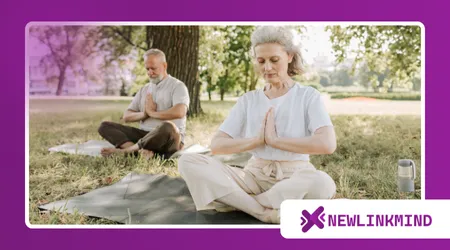The Link Between Meditation and Heart Health in Seniors

advertisements
Link Between Meditation and Heart Health. Exploring the robust evidence connecting mindfulness practices and cardiovascular vitality is essential, as the Link Between Meditation and Heart Health becomes increasingly significant for our aging population.
Seniors often navigate a landscape of elevated stress and various physical changes, making the adoption of non-pharmacological interventions like meditation critically important for maintaining well-being.
This discussion delves into the profound ways focused internal attention can support a strong, resilient heart, extending beyond simple relaxation to encompass tangible physiological improvements.
What Physiological Processes Connect Meditation to Cardiovascular Vitality?
Meditation fundamentally works by modulating the body’s response to stress, initiating a powerful cascade of beneficial physiological changes.
It actively engages the parasympathetic nervous system—our internal “rest and digest” command center.
advertisements
This activation counteracts the constant “fight or flight” mode often triggered by the sympathetic nervous system, responsible for stress responses that elevate heart rate and blood pressure.
The practice essentially teaches the body to recover from stress more efficiently and deeply.
Regular practice leads to measurable reductions in stress hormones like cortisol, which, when chronically high, are damaging to arterial health.
advertisements
By lowering these circulating biochemicals, meditation decreases the inflammatory load on the cardiovascular system.
How Does the Link Between Meditation and Heart Health Manifest in Seniors?
The mechanism primarily centers on lowering key cardiovascular risk factors, making a real difference in daily life.
Senior individuals, perhaps more than any other group, benefit from this gentle, non-strenuous intervention.
It offers a powerful tool for managing high blood pressure, a pervasive issue among older adults.
Read more: Meditation for Seniors with Hearing Impairment
Consistent meditation is known to foster vasodilation, easing the strain on the heart and helping maintain optimal arterial flexibility.
Moreover, improved sleep quality, a common benefit of meditation, directly aids in cardiac recovery, as the heart works less strenuously during deep rest.

Can Stress Reduction Alone Justify the Link Between Meditation and Heart Health?
Absolutely, stress reduction is a core pillar supporting cardiac health, but the benefits extend further than simply feeling calmer.
Chronic psychological stress creates physical wear and tear, damaging the delicate endothelial lining of blood vessels over time.
See how interesting: Meditation for Grief and Loss in Older Adults
Reducing this daily attrition means less opportunity for plaque buildup and hardening of the arteries.
Consider two seniors approaching a common daily frustration, like a technology glitch: one who meditates regularly and one who does not.
The meditator’s heart rate and blood pressure will spike less dramatically and return to baseline faster.
This small, repeated difference in reaction, over years, creates a profound protective effect on the vascular system.
What Research Supports the Connection Between Mindfulness and a Healthy Heart?
Scientific inquiry continually validates this long-held wisdom with hard data.
The American Heart Association (AHA) acknowledged meditation as a reasonable adjunct to guideline-directed cardiovascular risk reduction.
++ Meditation for Remote Workers
Furthermore, a long-term analysis published in a 2012 edition of Circulation followed subjects over five years, noting a remarkable 48% reduction in the risk of death, heart attack, and stroke among those practicing Transcendental Meditation.
That is an extremely compelling figure for any non-pharmacological intervention.
This body of work clearly demonstrates that the Link Between Meditation and Heart Health is more than anecdotal; it is a measurable clinical phenomenon.
| Cardiovascular Marker | Typical Effect of Regular Meditation | Significance for Seniors |
| Systolic Blood Pressure | Significant Reduction (e.g., 4-5 mmHg) | Decreased risk of stroke and heart attack. |
| Cortisol Levels | Chronic Reduction | Reduced systemic inflammation and arterial damage. |
| Resting Heart Rate | Moderate Decrease | Increased cardiac efficiency and reduced workload. |
| Heart Rate Variability (HRV) | Increased (Improved balance) | Enhanced autonomic nervous system resilience. |
How Can Seniors Start a Meditation Practice Safely and Effectively?
Beginning a practice is surprisingly simple and requires no special equipment, which is an ideal characteristic for seniors.
Consistency trumps duration, so starting small is key. A safe, simple approach is focusing on the breath for just five to ten minutes daily while seated comfortably.
One example of a simple practice is the “Traffic Light Breath”: sit and visualize a green light on the inhale, hold briefly on a yellow light, and slowly exhale on a red light.
This anchors the mind and regulates breathing. Another effective technique involves a “Loving-Kindness” meditation, where the senior silently repeats phrases of goodwill toward themselves and others, fostering a sense of peace that calms the entire nervous system.
Why would anyone ignore such a low-cost, low-risk opportunity to enhance longevity and quality of life?

Why is the Link Between Meditation and Heart Health so Crucial for Longevity?
Viewing the heart as a muscle subject to wear and tear helps illustrate the importance.
Imagine a car engine constantly running at high RPMs; it will eventually wear out faster than an engine that regularly cycles through periods of rest.
Meditation offers that regular, necessary downtime for the body’s most vital organ. It serves as a gentle “tune-up,” preserving the heart’s functional reserve.
The consistency of practice is what solidifies the Link Between Meditation and Heart Health, weaving it into the very fabric of healthy aging.
It moves beyond a one-off relaxation session to become a foundational strategy for physiological resilience.
Ultimately, embracing meditation offers seniors a proactive, dignified way to take control of their cardiovascular destiny.
This holistic approach supports traditional medical treatments, significantly boosting the quality of life, which is truly priceless in the later years.
Understanding the profound and practical Link Between Meditation and Heart Health empowers seniors to add not just years to their life, but health to their years.
Frequently Asked Questions
Is there a specific type of meditation best for heart health in older adults?
While various methods show benefit, mindfulness meditation (focusing on the present moment and breath) and Transcendental Meditation (using a mantra) are the most studied regarding cardiovascular outcomes, showing a strong Link Between Meditation and Heart Health.
The best type, however, is the one a senior will practice consistently.
Can meditation replace my current heart medication?
No, absolutely not. Meditation is considered an adjunct therapy, meaning it should be used in addition to, not in place of, prescribed medications and a doctor-recommended healthy lifestyle.
Always consult a physician before making any changes to your treatment plan, even when exploring the Link Between Meditation and Heart Health.
How quickly can I expect to see lower blood pressure results?
While immediate calming effects are common, significant and lasting reductions in blood pressure typically require consistent daily practice for several weeks or months.
The long-term Link Between Meditation and Heart Health is built on regularity and dedication.
Is it too late to start meditating in my 70s or 80s?
It is never too late. The benefits of stress reduction and parasympathetic activation are available at any age.
Even short, daily sessions can positively influence your wellbeing and strengthen the Link Between Meditation and Heart Health.
